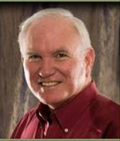How to Successfully Transition Your Church through New Leadership
- Updated Jan 08, 2015

Editor's Note: Pastor Roger Barrier's "Ask Roger" column regularly appears at Preach It, Teach It. Every week at Crosswalk, Dr. Barrier puts nearly 40 years of experience in the pastorate to work answering questions of doctrine or practice for laypeople, or giving advice on church leadership issues. Email him your questions at roger@preachitteachit.org.
“You're going to die, retire, quit or get fired,” said Jim Collins (the author of Good to Great). "You'll not pastor your church forever.”
“What!” I thought, as he addressed our small conference of twenty pastors. I was busy building Casas, our church, and growing a people! I assumed that I’d pastor Casas forever. Such is the immortality of youth.
“Now, consider this,” asked Collins, “what will happen to your church after you are dead, retired, quit or fired?”
“The greatest hindrance to the ongoing success of an organization is the charismatic leader who founded it,” he continued.
I was stunned. I had basically founded Casas--from seventy people to over 10,000. Might I one day be its greatest hindrance to thriving and surviving?
Juan Tripp founded Pan American World Airways. Pan Am circled the globe like no other airline. Tripp often boasted that it took an unusually gifted man (himself) to build an airline like Pan Am. In fact, he often boasted that Pan Am could never survive without him. With a little humility and planning, Pan Am might well be still flying the friendly skies. Unfortunately, the airline died shortly after Tripp.
Collins' next book, Built To Last, detailed the common factors for the success of organizations that last over 100 years—like Johnson & Johnson and the Boeing Aircraft Company.
First, Collin's research revealed 100-year-old organizations hire from within.
Every organization has a culture. Ministers we hire from outside of Casas tend to last five years or less. They run into cultural issues that they most often misplay. Both they and the people end up hurt.
On the other hand, pastors that we hire from inside tend to last twenty to thirty years and longer. They know how to navigate the culture. They know where the boundaries are and just how far they can go without stirring up unmanageable conflict.
Next, organizations that last over 100 years take ten to fifteen years to transition to new leaders.
Most churches don’t have the luxury of cultivating someone in the organization to take over five or ten years later. Finances can be a problem. More importantly, there is the issue of what to do with the pastor-in-waiting until it's time for him/her to take over.
In addition, organizations that last over one-hundred years groom four or five individuals to be the next leader. When the present leader leaves, one of the four or five becomes the next leader and the others are fired.
Very few churches will follow this example. However, it does bring up the issue of what happens in many churches--especially small ones. In many smaller churches the people are the stabilizing force. They stay for the long haul. Pastors come and go. So, the church family chooses their own new leader.
One of my dreams was to pastor a multi-generational church. Most churches last for a generation and a quarter. The founders lead and guide and finance the church for twenty-five years or so. Their children grow up in the church but don’t stick. The children of the first generation leave to seek their own spiritual fortunes. Their departure is only natural. Teenagers and young adults navigate in a very different culture from mom and dad.
If the church is to last a significant number of years then it must respond well to a changing culture. Changing the church culture is no easy task. There are worship wars to fight. Presenting the gospel to a new generation often looks little like the presentations of the past. Preaching styles change. Team teaching and team leadership looks very different from the old days of having only one pastor. Pastoral care in many changing churches can be virtually nonexistent. Car rallies on the Sunday morning church parking lot are quite effective in drawing people who have never put a foot in church to put a foot in church. Only strong leadership and lots of time can change the church culture. Only by handling well these transitional changes can a church reach the next generation.
This means that the pastor being cultivated must be part of a younger generation.
When I arrived at Casas at the age of 25 I was part of the "Boomer" Generation. Casas was a "Builder" church. Over the next ten years I studied the church culture and pushed back the boundaries. Eventually, Casas was a "Boomer" church. We transitioned to the second generation. About ten years later it was time to start planning for the third generation.
I baptized Glenn when he was eight years old. When he was sixteen I heard God telling me that one day Glenn would be my successor. I admired Glenn's guts and confrontational courage. During his high school years he and Jack Gracie went every year to the Utah State fair where they set up a table and argued with Mormons. He also was sold out in his passion to love Jesus and to bring unchurched, unconnected people into the presence of Jesus. He longed to make the church relevant to his culture. He trained under Bill Hybels and went on to pastor a brand-new church in Kalamazoo, Michigan. I was 50 years old. Glenn was 30--time to make plans to pass on the torch.
I invited him to Casas. After much prayer, thought and consideration Glenn returned to the church of his youth.
We agreed that for the next five years I would be "over" Glenn while Glenn focused on reaching "Generation X" aged people. Then for the next five years Glenn and I would share the responsibilities of leading and pastoring the church. I yielded to Glenn most of the meetings, vision casting and leadership. Then, for the final five years, I would pass the baton completely to Glen. After that, I would "disappear" to Dallas to care for aging parents and enjoyment of our children and relatives. A new pastor can never be the real pastor until the old pastor moves completely away.
Under Glenn, Casas is in its third generation as it has morphed into a "Generation X" church. As Glenn approaches fifty, the one who will lead Casas into its fourth generation as a "Millennial" church is already on staff and commencing his transition into full-fledged pastoral leadership. Casas' transition into its fourth generation is well under way.
Not long from now, my "boys," as I call them, will be searching for the person who will lead Casas into the "Nones Generation." This will be the fifth generational change for Casas. The term "nones" refers to non-religious people. The number of religiously unaffiliated Americans is increasing dramatically.
By the way, Casas' transition is working marvelously well as Casas is thriving six years after my departure.
I had a lot of dreams for Casas. One was to leave the church debt-free. We built 18 buildings under my leadership and eventually transitioned to a 100 acre site. The cost was enormous. However, we believed that if someone wanted to come to Casas then the least we could do was to provide them with a seat. Casas grew according. One of my promises to Glenn and the rest of the ministers was that I would leave them with a church debt-free before I was 65. I am now 64 and last week the mortgage was completely paid off. As a result, Casas now has an extra $500,000 plus to pour into ministry each year.
Let me leave you with several thoughts.
First, take care of home base. Home base is you and your family. It's one thing to transition a large church to a new set of leaders. It's quite another for a pastor of a young church or a small church to attempt an early transition and departure.
My friend, Sam, dreamed of transitioning his church to the next generation. He knew that this would only be accomplished with a younger pastor. He told me of his plans to turn over the church when he turned 60 years old. I replied, "What a great idea; but, have you thought about what you will do after 60?" He was so intent on taking care of the church that he neglected to care for himself. "Are you financially ready to retire at 60?"
"No," he replied.
"So what you're really telling me is that you'll be 60 years old and have no job. Most churches aren't hiring 60-year-old men and women."
"Yes, but I'm really concerned with the future of our church. I've given my life to the church. God will take care of me somehow."
"Yes, but one of the saddest things I see are pastors who gave their all for the church and left themselves with nothing. You might consider that transiting to a younger man is putting yourself out of a job. Those years from 60-68 might be rather important in your financial planning."
My biggest mistake in the transition was not taking care of home base. I took so much time and effort preparing the church that I forgot to plan to take care of me. I've pastored since I was 18-years-old and it was over. I didn't know what to do with myself. How could I ever have known that the last sermon I would preach was titled "Unplugged”?

Publication date:




















